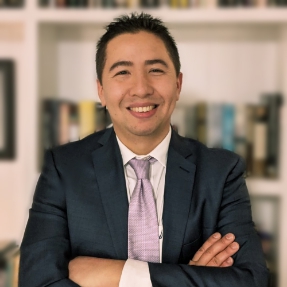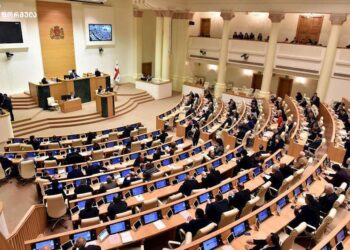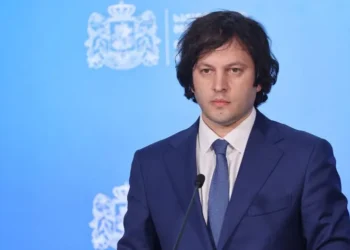It’s clearly an attack on Georgia’s EuroAtlantic choice, an attack on Georgia’s democracy, an attack on Georgia’s strategic partnerships with the West, and an attack on the Georgia and US bilateral relationship. It’s also quite self-evidently, an expression of deference to Moscow and an alignment with Russian interests in the region, – CSCE Senior Policy Advisor Michael Hikari Cecire tells RFE/RL’s Georgian Service of the controversial law that was set to be imposed this week.
“Legislation like this is so painfully undemocratic,” he notes. “What it does is signal the ruling party’s willingness to undermine and attack all elements, all institutional edifices, of the remnants of Georgia democracy. It’s not just the law itself which is abysmal, it’s really an assault on the last redoubt of independent thought in Georgian society, and that’s civil society and the media. It also signals a willingness to turn the power of the state against any other forms of independent or democratic expression.”
Michael Hikari Cecire joined the US Commission on Security and Cooperation in Europe (CSCE), where he focuses on the South Caucasus and Black Sea regional affairs, as a senior policy advisor, in 2021. Previously, he was an analyst at the Congressional Research Service, before that serving as a policy advisor, strategic researcher, and Eurasia regional analyst supporting the Department of Defense and other US government agencies. We sat down with him to discuss the foreign agents bills the Georgian Dream ruling party were set to put into force this week. The interview took place before the party offered to withdraw the bills following 48 hours of protest and rioting.

Michael Hikari Cecire
One of the arguments we’ve heard for those supporting these bills is the very same argument that Russia used back in 2012 to introduce a similar legislation: “Well, if the US has it, why can’t we?” What do you think of these comparisons? Does the US having FARA justify Georgia doing what it’s doing?
What is clear is that the Georgian Dream political leadership isn’t even bothering to offer their own independent, even bad faith, arguments for this law. They are just aping Russian arguments that were made about their law, and Azerbaijani arguments about their derivative law, demonstrating their fealty to Moscow and a lack of independent thought even to create their own separate narrative. It’s very sad to watch that play out. I don’t think most Georgians are buying it, though, because it’s so blatant and so unoriginal. And for the record, I think it is worth saying that this has nothing to do with FARA, which is a very narrow bit of legislation and really only covers those who are working for and on behalf of foreign governments and foreign political parties. It’s really speaking to lobbyists in particular, to represent these interests, and has nothing to do for the most part with civil society or the media.
There is a sense in society that, should this law pass, it would merely be the start of a path to somewhere bad. Where does that path lead?
Crossing that line is an opening to other sorts of law or actions that can really radically transform Georgia from an imperfect but vibrant and pluralistic democracy, into a fully autocratic and perhaps even authoritarian country, and one in league with Russia. And as such, because Russia has no allies and only vassals, essentially a tributary to Moscow.
We have to make it clear where we stand. And we stand with the Georgian people. We stand with Georgia’s democracy
If all your nominal partners in the West, and all of those whose counsel you should be heeding domestically, are telling you not to do it, then that means your partnership and your source of counsel is coming from elsewhere. And that elsewhere is quite evidently Russia. The rationale for this is unclear, and there are a number of potential reasons this may be the case, but none of them are good, and none of them are satisfactory in terms of why Georgia should be going down this route.
What can or should the West do about it?
I think that we need to do what we are doing, which is to make it very clear that this is an attack on not just our relationship, and not just on the will of the Georgian people, but also an abrupt and deliberate shift into Moscow’s column.
It’s clear to me that they don’t care very much about the health or maintenance of Georgia’s democracy, per se, or even about Western integration, and this is also something that could make a lot of things that we previously never would have entertained suddenly possible, such as the elimination of a lot of support for Georgia’s participation in western forums and the travel, prestige and attention that comes with it.
It also means potentially that certain people are going to start for the first time genuinely entertaining the thought of what individual sanctions might be considered and on whom they should be levied. The democracy support is not going to end. It may have to change, but it’s not going to end. But you know, the way we support other elements in Georgia, particularly the way we support the state as a whole, may not be justifiable if the state is captured by a party that has become openly pro-Russian.
Sanctions would mark a genuine change from the words, however critical, we’ve been hearing for years now, to a whole new phase of actually doing something. What would those actions be? And had the West done it years ago, could this have been prevented?
I’ve been very open about the fact that I was not comfortable with sanctions in the past. In the past, sanctions were not the right move, because it seemed to feed into the worst paranoid tendencies of the Georgian Dream leadership; the idea that we are actively trying to undermine them and overthrow them. A lot of those perceptions led us to where we are today.
In the past, I was not supportive of sanctions, but actions do have consequences, and this descent into full and open alignment with Moscow is an attack on Georgia’s democracy, and it represents a point we cannot hope for something better to come out of; we can’t hope that carrots and incentives can turn things around by themselves. Instead, we have to make it clear where we stand. And we stand with the Georgian people. We stand with Georgia’s democracy.
I think that certain sanctions might be considered- not in the sense that “we are going to do it because we want to,” but to make it very clear that a line has been crossed, or is going to be crossed, beyond which only dark things exist.
We certainly shouldn’t be writing off an entire party if they’re genuinely willing to return to their democratic obligations
There is this idea that the US has been trying to overthrow Georgian Dream, which is patently false. And there’s this idea that there have even been shadow sanctions related to this Credit Suisse business, which is also patently false. We haven’t done anything. In fact, we’ve been remarkably nuanced and remarkably restrained, in many respects.
Would those sanctions include individual sanctions on the big elephant in the room that might well be behind all of this?
Everything would be looked at. Absolutely. But one thing that’s important to say is that nothing is irreversible. And as bad as things are, they don’t need to go further. And there is a path back to friendship, cooperation.
Even with Georgian Dream?
If they are able to demonstrate a genuine willingness to come back and not take this authoritarian term, then why not? But they have to make that part clear; we have to really see it. Under those conditions, the US and Georgia still have a potentially very bright future, and there is a possibility of great bilateral relations. We can go back to that. That’s my hope, but the ball is in their court.
Does this not remind you of the West’s incessant attempts to find mutual ground with Putin over the years?
No, because I think Russia has never not been an empire. And Russia, in every political expression, has been a violent and poorly oriented empire.
In Georgian Dream, there’s clearly a difference in its sliding into subservience to Moscow. But it wasn’t all that long ago that we had a very productive and good relationship with the Georgian Dream government, when Margvelashvili was president and Kvirikashvili was prime minister. It wasn’t perfect, but no country that we work with is perfect. Not even our own. So I don’t think there’s anything necessarily inherent. It’s the same with the UNM – it’s not necessarily an authoritarian party because they took an authoritarian turn at some point. They also did a lot of good, and we also had a great relationship with them at times.
We have to be open minded, and we certainly shouldn’t be writing off an entire party if they’re genuinely willing to return to their democratic obligations. But until that happens, it’s all rather academic, unfortunately.
Interview by Vazha Tavberidze














